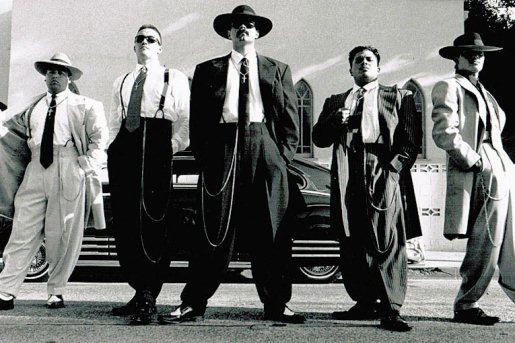Joaquín Murrieta is Free!By Alberto Ramirez The broadcasting xylophone chimes of KHJ-FM sounded over the Philco, table-top radio in the Leyva family parlor and brought Señora Leyva from the kitchen with soup ladle in hand. She fiddled with the radio station dial, tuned out the static, and turned up the volume. The announcer, in a booming, chipper, sing-song cadence, welcomed his listeners. “Greetings, Angelenos! Soon, The Adventures of Arnie Guff, Master of Disguises, but first the news—brought to you by Spielman’s Appliances, proudly serving Los Angeles since 1902, located on the corner of State and First Street, in the heart of Boyle Heights. Sailors and young zoot suiters clashed again last night, this time outside of the Aragon Ballroom in Venice Beach. Ten Mexican youths, all armed with crude weapons, were routed and stripped of their garish suits by Uncle Sam’s fighting men, then promptly arrested by police and hauled off to the Los Angeles Hall of Justice. These latest arrests come after service men declared war on zoot-suit gangs who have been preying on innocent citizens on the East Side of the city. According to authorities the street battles represent an increasingly serious State-wide juvenile delinquency problem. The L.A. City Council has proposed a resolution that would ban the wearing of zoot suits in public. In other news . . .” “¿Oíste Turi?” said Señora Leyva. “Dijo el señor que es peligroso salir esta noche.” Arturo “Turi” Leyva—tall, dark and dimpled faced—stood proudly in front of the parlor mirror, combing a gob of Pomade into his thick, black, handsome head of curly hair. “It’s fine amá,” he said. “No te preocupes. I’m just taking Rosie up to the Orpheum to catch a show. We won’t be out too late.” “¡Ay Turi! Tú aquí y tu hermano Martín en la guerra. ¡Ya no puedo!” “The war is the war, amá ,” he said. “I’m sure Martín’s ok. He said so in his last letter home.” Turi brushed lint from the broad shoulders of his brand new, pin-striped drape jacket, ran a hand the length of his pleated, balloon-legged trousers and wolf whistled long and low. “¡Firme!” he said. Señora Leyva—diminutive, yet physically overbearing in her matriarchal serge smock—pushed up on Turi’s heels and whispered omens in his ear. “Dijo el señor que tu traje es ilegal.” Turi ran the plastic comb from the crown of his feathery, jet black pompadour to the tip of his perfectly tapered duck-tail. “I worked hard for the money to buy this suit,” he said. “I look good in it. That ain’t illegal.” He always wanted a suit like this, ever since he saw Prince Edward, the Duke of Windsor himself, wearing a fancy long coat in Life Magazine, shaking Adolf Hitler’s hand a few years before the War began. Never mind the war-time rationing of fabric and the accusations of being Un-American. Was he to blame for the German invasion of Poland? Was it his fault that the Japanese had bombed Pearl Harbor? Did the Allied victory really hang in the balance of a few extra yards of worsted wool? He deserved a suit like that and so he worked overtime at the Pan-Pacific Fisheries, the tuna cannery on Terminal Island, for piece-work pay, saved his money for six months and paid Tiburcio the Tailor of East L.A. $20 cash for a first-rate, bespoke Zoot Suit. And what a suit it was! It made him feel like a real American. “Cámbiate, mijo,” his mother pleaded. “I’m not changing, amá,” he said, defiantly. “This is me.” Señora Leyva circled around and stood in front of Turi, blocked the mirror to get his undivided attention, and looked him square in the eyes. “Bueno,” she said lovingly, “tú sabrás. Te vez muy guapo. Pero por el amor de Dios ten cuidado mijo.” “I’ll be careful,” he promised. She saw him off on the porch, made the sign of the cross over him—as if she were sending a second son off to war—kissed him on the cheek, and watched over him as he strolled up Orme Avenue into the night. Back inside, in the family parlor, Señora Leyva tuned the radio to her favorite program—Everything for the Boys—to hear the latest news about the War and the American servicemen stationed overseas. Weeping softly into a plush red scarf, she lit a rose-scented, Virgen de Guadalupe votive candle for her two sons, for the one here on the home front in Boyle Heights and for the other across the Atlantic Ocean, on the front lines in Germany. She prayed the rosary: “Padre nuestro, que estás en el cielo, santificado sea tu nombre...” Turi caught a Yellow Car—the P-Line going downtown—on the corner of Whittier Boulevard. The conductor welcomed him aboard, tipped his cap, rang the bell and put the streetcar into motion. It lurched forward, gliding along smoothly on steel wheels, the cool, jasmine fragranced night air blowing in through the open windows. The coach was empty, the long, cylindrical tube with its silver and green interior shining by a row of flying saucer lights. Turi made his way to the back and slumped down in a seat by the rear exit door. He sat there thinking of nothing in particular and everything all at once, as one does while sitting alone in the back of a streetcar: the people all abuzz on the boulevard going out on this warm, springtime night, to the jazz clubs and the Mexican restaurants, to the cafés and the cinema to see Casablanca, A Guy Named Joe and Destination Tokyo. His best girl Rosie. A bonafide bombshell, as fine as any pin-up girl. Plump, ruby lips, high cheekbones, button-nose, sparkling brown eyes and perfectly done-up platinum blond Victory Rolls. What a doll! His big brother Marty the fighting GI. And the War. When would it be over? When would the god damn Axis call it quits? When would they let Martín take the big boat home? The Yellow Car came to a screeching halt on South Boyle Avenue to let on a passenger, a skinny Mexican-American kid who dropped the fare into the slot and came sidling coolly down the aisle. “¿Qué te pasa, calabaza?” said the kid, making his way to the rear. “¡Nada nada, pinche Chavala!” said Turi. Baby-faced Jimmy Lara, a kid two years Turi’s junior at Roosevelt High School, strolled into the light, combing his princely, Teddy boy hair. “¿Y tu mamá ?” said Jimmy. “She actually let you out of the house? ¿Y eso? Ain’t it passed your bedtime mija?” Turi socked him playfully on the arm. “Don't flinch, don't foul, hit the line hard!” “Ok,” said Jimmy, plopping down on a seat. “Ya, Rough Rider!” “Pues no mames güey!” Jimmy looked Turi up and down, admiring his brand new suit. “Nice drapes carnal,” he said. “Where’ya steal ’em?” “Bucho’s in East Los.” “I’m gonna buy me a traje like that someday.” “Pues stop flubbing the dub and get a job, Jimbo.” Jimmy gawped wistfully at the zoot suit, at the beautiful stitch work, the perfectly tapered trousers, hemmed just so, and the fine, double-breasted jacket that looked like it belonged to a well-to-do Anglo-American, to someone famous, a movie star, Clark Gable or Humphrey Bogart. Looking down at his own plain white, button-down shirt and his old, brown corduroy pants, he turned abruptly and spat out the trolley window. “Entonces que, Jimbo,” said Turi. “¿Qué onda?” “Oh what? You didn’t hear?” “Hear what?” Jimmy made a sound like a car getting a flat tire. “Pues Uncle Sammy’s Sailors, that’s what. Están bien encabronados. They’re turning up like pinche fire ants from the Naval Reserve Armory over in Chavez Ravine, cruising into the barrio, looking for a fight. It’s war.” “I heard it on the radio.” “¿Si ya sabes, pa qué te digo? Anyways, I’m going downtown, see if I can’t get into a bronca, have myself some fun. ¿Y tu?” “I’m meeting Rosie at the Orpheum. Going to see a show.” The streetcar conductor glanced in the rear-view mirror. “You boys really shouldn’t be out tonight,” he said. “It’s going to get hot out there. Those sailors ain’t messing around. I saw them beat a Mexican kid on Central Avenue last night. Poor kid was busted up pretty bad.” “¡Chale!” said Jimmy. “Those pinche gringos ain’t even from around here. El Pueblo de Nuestra Señora la Reina de los Ángeles is my town!” “Damn right,” said Turi. “¡No, hombre! Next thing you know they’ll be locking us up in el bote, too, like they did my neighbor Kenji y su pobre familia.” “¿A poco?” said Turi, agasp. “Yup. Took him right out of 2nd period math class, then went down to his house on Soto Street to round up the other Okamuras.” “¿Así nomás?” “Así nomás. No crimes committed, no trials, no convictions, no nada. Straight to Owens Valley.” Jimmy whistled chirpily and made a fluttery gesture to show how quickly they’d been taken and that they likely wouldn’t be coming home. “¿Oye, y el Johnny Schmitz?” “¡No, hombre! ¡Ese pinche, blue-eyed güero! ¿Que tú crees? They left him sitting muy tranquillo at his desk in Mr. White’s 4th period mechanical engineering class. Hasta le dieron milk y cookies al güey.” “¡Chinga su madre!” “Y sus antepasados también.” They sat quietly, thoughtfully looking out at the city lights as the Yellow Car chugged across the Los Angeles River over the Sixth Street Bridge. It was a lovely city, especially at night, despite the news of the day. As they passed the steel arch mid-section of the bridge Turi pointed out the window, gawking slack-jawed as if he’d seen La Llorona on the riverbank. “Look!” he said. Jimmy turned in time to see—painted on a broad steel girder in big, white letters—a declaration of independence. Joaquín Murrieta is Free! Neither had a clue as to what it meant, but both felt their spirts suddenly lifted. An inexplicable rush of joy like captive eagles sprung from cages. Pachucos with wings soaring over the sacred City of Los Angeles, high above the madness and the mortal fray and thoughts of incarcerated neighbors. “Next stop South Broadway!” called the conductor, ringing the bell. The Yellow Car coasted to a gradual stop and Turi and Jimmy came down reluctantly from that other place beyond the clouds, the stars and the dream of freedom. “Is this your stop?” asked Turi. “Nah,” said Jimmy. “I’m getting off at the Orpheum.” “Pues órale.” The streetcar turned south and proceeded along Broadway for three city blocks until the Orpheum Theater appeared along the streetscape through the row of trolley windows—a red and green neon beacon in the night. A Beaux Arts palace shining by a row of swiveling Hollywood searchlights. The marquee was all aglow, the black letters boasting the act for the evening. Count Basie and His Famous Orchestra! |
Archives
July 2024
Categories
All
|
Donate and Make Literature Happen
is published by the Somos En Escrito Literary Foundation,
a 501 (c) (3) non-profit, tax-exempt corporation. EIN 81-3162209




 RSS Feed
RSS Feed